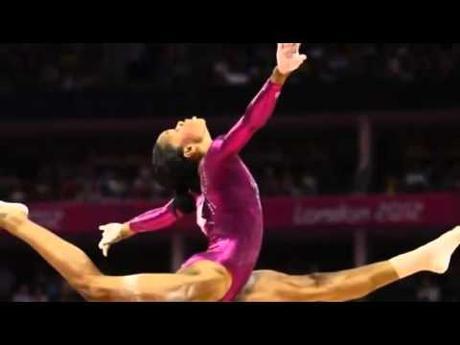
Gabby Douglas.
There is absolutely no question that racism still persists in the United States today. While examples of this systemic reality abound — from racism in the criminal justice system to the disproportionate punishment of black girls in schools and beyond — one need look no further for evidence than this past week, which saw the tragic deaths of Alton Sterling and Philando Castille. In fact, the police have killed at least 136 black people in 2016 alone, according to the Guardian.
Perhaps now more than ever, therefore, it’s important for young, black Americans to have exposure to black people succeeding despite the many systemic barriers in their way. This seems especially important for women of color, who are so often erased even from discussions of liberation. Of course, there are many examples of black, female role models across the board, but two that embody and have been vocal about succeeding against the odds are athletes Gabby Douglas and Serena Williams.
Douglas and Williams have both experienced challenges centered around their identities as African American women. Gabby Douglas, the defending Olympic champion and first African American woman to win all-around gold at the games, has again been selected as one of five members of the United States Women’s Olympic gymnastics team. These would be incredible accomplishments for any gymnast, but are made all the more impressive for Douglas given that the sport of gymnastics in the United States is notoriously non-diverse. Williams also consistently dominates a primarily white professional sport: She is ranked number one in women’s singles tennis and is widely considered one of the greatest athletes of all time.
But while both women are doing incredible things in their respective sports, they still face unprecedented challenges that are intertwined with broader attitudes of misogyny and racism. For example, Douglas told Oprah she experienced race related bullying while at Excalibur, the gym at which she trained in Virginia Beach. While Williams first trained on public tennis courts in the predominantly African American community of Compton, California, she has since endured vicious attacks on her femininity, which are usually linked to her race. Williams and her sister and fellow athlete Venus were called “the Williams brothers” by Russian Tennis Federation Head Shamil Tarpischev, who also said, “it’s scary when you really look at them.” What’s more, this disparate treatment goes beyond personal attacks. Williams has historically been less marketable than Maria Sharapova, a white tennis player whose record was far less impressive than Serena’s — this great athlete seemingly made more money thanks to our society’s discriminatory preference for the traditional beauty standards exemplified by thin, athletic, blonde women.
Despite these critics, Williams and Douglas both continue to shine as incredible athletes who take pride in the strength and ability of their bodies. Douglas offered the advice that young women who face obstacles similar to hers should “always be courageous and strong, don’t fear.” Williams has hardly let negative comments influence her, either, and has said “I literally was born with this most amazing body … And if anyone doesn’t like it, then they don’t have to. Because at the end of the day, I like it. And I know a lot of other people who like it too.”
Ultimately, the struggles that Gabby Douglas and Serena Williams have dealt with throughout their professional careers despite their immense, inarguable talent highlights the litany of ways racism and misogyny color the everyday experiences of many minority women in this nation. But as Serena Williams has reminded us, “the success of every woman should be the inspiration to another. We should raise each other up. Make sure you’re very courageous: be strong, be extremely kind, and above all be humble.”
We must continue to speak out about and refuse to tolerate the particular experiences of misogynoir black women in America face. But as we do so, the successes of Serena Williams and Gabby Douglas serve as a testament to the future we’re fighting for — a future in which black women can and do reach their full, incredible potential.

